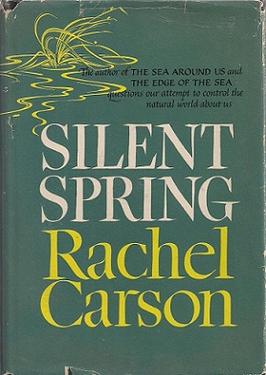The election of Annamie Paul as leader of the Green Party of Canada comes as no surprise. She is the third woman to lead the Greens since the party was founded in 1983. It is worth remembering that the new Green leader stands on the shoulders of countless women who have been at the forefront of the environmental movement dating as far back as the early twentieth century. Nor can we forget the debt of gratitude we owe to the trailblazing work of Rachel Carson whose book, Silent Spring, prompted a revolution in environmental consciousness and did more than any other single publication to alert the world to the hazards of environmental poisoning. Never underestimate the power of a book!
But the success of Silent Spring was not a foregone conclusion. Carson herself was somewhat reluctant to take on the topic of pesticide use and its deadly consequences. She was a marine biologist and best-selling author in 1962 when Silent Spring was published. Her “poison book,” as she called Silent Spring, would undoubtedly face harsh attacks from the chemical industry, its paid scientific hacks and political allies. In fact, the chemical industry threatened to sue Carson’s publisher, Houghton Mifflin, if the publication of the book went ahead. On a CBS television program in 1963, a spokesman for chemical manufacturers said: “The major claims of Miss Rachel Carson’s book, Silent Spring, are gross distortions of the actual facts, completely unsupported by scientific, experimental evidence, and general practical experience in the field… If man were to faithfully follow the teachings of Ms. Carson, we would return to the Dark Ages and the insects, and the diseases, and the vermin would once again inherit the Earth.”
The media tried to undermine Carson’s scientific credibility by accusing her of being radical, disloyal, and hysterical. Because she had no institutional affiliation, she was dismissed as an amateur who did not understand the subject of ecology like a professional scientist would. Carson was linked to faddists and pseudo-scientists, the kind of crackpots who worshiped organic gardening and natural food. Only decades later did Carson’s warning about dangerous substances in food take hold with a vengeance and help to fuel the exponential growth in the global organic food market.
Despite the criticism leveled against Rachel Carson, Silent Spring also had an enormous political impact, eventually leading to the establishment of the U.S. Environmental Protection Agency and the banning of DDT in the United States for agricultural purposes. Yet, these achievements cannot be attributed to Carson alone. She was surrounded by a network of women environmental warriors, described compellingly in R. Musil’s book, Rachel Carson and Her Sisters (2014). Carson leaned on a coterie of female conservationists and environmental health writers for research material, mentorship and political connections.

(File:SilentSpring.jpg Wikimedia Commons)
Today, the leadership of women, regardless of age or nationality, remains central to the growth and achievements of the environmental movement. The investment of women in saving the planet from global warming is as unwavering now as Carson’s critique of pesticide use was in the thorny past.
Gail Benick is a Toronto author and educator. Her career as a professor on the Faculty of Humanities and Social Sciences at Sheridan College in Oakville, Ontario, spanned more than three decades. Her debut novella, The Girl Who Was Born That Way, was published in 2015. Her new novel, Memory’s Shadow, will be published in spring 2021.


Great shout-out to Rachel Carson and the many women who have led the environmental awakening! myer
Let’s not forget the role of Indigenous female elders who remind us of our responsibility to the earth, Elizabeth May who has contributed so much to the Canadian discourse on the environment, and to our new young women leaders like Greta Thunberg who have raised awareness of the issues around the world.
This article was very interesting in that I was not aware that Rachel Carson’s book Silent Spring was very instrumental in the US government eventually banning the use of DDT. Also that women have been in the forefront of fighting against global warming.
I am a big fan of Gail Benick and have been looking forward to reading her second book for several years now so am glad to hear it will be available next spring
Thank you for this thoughtful and beautifully written essay.
Congratulations, Gail!
Thank-you for this reminder, Gail, not only of the important role of Rachel Carson in the early days of environmental and climate awareness, but also of the abiding role women continue to play. Now more than ever these voices need our attention and our action.
Gail, I am very pleased that you highlighted Rachel Carson and her book, Silent Spring, many refer to it as the bible for environmentalists
And that you pointed out that several leaders for the Green Party are women.
As Carson so perfectly pointed out we are one with nature not separate.
Thank you
Thanks, Gail, for referencing the huge influence that Rachel Carson had on the contemporary environmental movement. Women have been there all along, gathering data, writing, marching, speaking out. I look forward to seeing the new book in print. When might it be available?
This was a great piece. Not only does it keep the climate crisis in the forefront but it also highlights these women who are valiantly carrying on the fight.
Gail is such a good writer.Hopefully her latest book will Memorys Shadow will be published very soon.
Having never heard of Rachel Carson, I found this to be a very informative blog about her and her book Silent Spring. It is very inspiring to all women that Ms Carson was in the vanguard of environmental consciousness, despite the opposition and criticism she received. Thank you, Ms Benick for this informative blog.
Insightful and an important reminder of how necessary it is to hear and respond to the voices of woman that know, care and advocate for change.
Gail Bennick leads the way as women often do in the things that really matter. This Blog is timely and so important a topic. Makes me think of the enthusiasm and power of Wangari Maathai in Kenya and her Greenbelt Movement of tree planting and her absolute conviction about the power of women to protect and regrow on the earth as they fight together for women’s rights.
I am getting old and still I wonder how to direct my energy for the benefit of all our children and theirs. Besides supporting the green movement, or how to better support it???
Thanks, Gail, for reminding us of the trailblazing work of Rachel Carson, with whom I share an undergraduate alma mater. When I arrived at Chatham College in 1964, I quickly learned about her daring and (then) controversial work. Unfortunately, it has taken decades for her to gain the accolades that she deserves.
Gail, I look forward to your next book. When might it be available?
This was a wonderful read! It’s always powerful to be reminded of the many women paving the way for a better future. Although I never read Silent Spring, I find it extremely relevant and important for us to consider the scientific work of women to have a clear, well-rounded understanding of the truth. Thanks Gail for a great read.
Thanks Gail, for your eloquent reminder about the important role that women are playing as courageous protectors of our mother earth.
Well written. Rachel Carson opened our eyes to the effect of chemicals in the environment . She tirelessly and resolutely advocated against great odds. Now more than ever with climate change, air pollution and a host of other assaults on the earth do we need to listen to and assist the brave Rachel Carsons of the present.
Here’s a timely profile of the important role of women activists in the environmental movement and a reminder of the continued leadership of women in the environmental movement.
Good to be reminded of the history of environmental advocacy and women who have come before us. Thanks for a well-written blog post.
Great Blog-post and thanks for sharing. I look forward to reading Silent Spring and learning more about Rachel Carson.